#10 minute school email marketing
Text
Nicki Minaj and Cardi B Carpool Karaoke
#Nicki #Minaj #Cardi #Carpool #Karaoke
0.38 [Music]
0.38 no
0.38 [Music]
0.38 you know what now you sound like you're
0.38 kind of taking it
0.38 um
0.38 well when i do private parties i'd be so
0.38 shy
0.38 like i did a bar mitzvah not so long ago
0.38 and i never performed in front of so
0.38 many kids oh
0.38 and then like my dj he didn't have the
0.38 clean version of the song…

View On WordPress
#$0 marketing#$7 affiliate marketing course#0 dollar marketing#0 investment affiliate marketing#0 investment digital marketing#0 to 1000 affiliate marketing#0 to 10000 affiliate marketing#0nline marketing#1 page marketing plan#1 page marketing plan audiobook#10 log marketing#10 minute school affiliate marketing#10 minute school digital marketing#10 minute school email marketing#12th commerce it digital marketing#12th commerce ocm chapter 8 importance of marketing#12th ocm marketing#15 psychological marketing triggers#2024 affiliate marketing#2024 digital marketing strategy#2024 digital marketing trends#2024 marketing#2024 marketing trends#2024 social media marketing#22 immutable laws of marketing#22 immutable laws of marketing audiobook#2nd puc business studies marketing chapter#2nd sem marketing management#3 cʼs of marketing#3.0 remote marketing agency
0 notes
Text

^^^ From the new Florida public school history textbook.
DeSantis's efforts to persecute minorities for political gain continues to have a negative impact on Florida's convention business.
DeSantis’ ‘anti-woke’ bills are costing Florida millions of dollars in business
A slew of new bills signed into law by Republican Florida Gov. Ron DeSantis has draped the Sunshine State in controversy, spurring protests, lawsuits and travel advisories warning the state is “openly hostile” toward people of color, immigrants, women and LGBTQ+ community members.
The fallout is starting to spread to a key economic artery for an income-tax-free state heavily reliant upon tourism taxes: Florida’s convention business.
In recent weeks, at least a dozen organizations have announced plans to either cancel or relocate their upcoming conferences scheduled to take place in Florida, making a statement by having their thousands of attendees and millions of dollars flow into other states deemed safer and more welcoming.
Conventions are often planned out years in advance. So the reaction to the DeSantis homophobic, racist, and anti-women policies could ripple years into the future.
“Unlike leisure business, which is a very short-term booking window [in weeks or months], conference business is long term,” said Stacy Ritter, president and chief executive officer of the Visit Lauderdale tourism marketing agency in Broward County, Florida. “We’re booking ’26 to ‘30 now, so any impact that this might have is not going to be seen for years to come.”
As of July 26, Ritter said that Visit Lauderdale has tallied 10 events and conventions that were canceled by organizations citing recently enacted laws, policies and travel advisories. That amounts to 15,000 lost hotelroom nights and an estimated $20 million economic impact, she said.
Ritter, a longtime Democratic politician in the state, said she first started to see some businesses pull back following the 2022 legislative session and the first iteration of the ruling known as the “Don’t Say Gay” law. At the time, she also received emails from leisure travelers suggesting they wouldn’t come back to Florida because they perceived it was hostile to the LGBTQ+ community.
“That trickle from last year became a little stronger,” she said. “I don’t have a crystal ball, I wish I did, but I don’t know what happens in the future if this becomes a thing, or if this is a blip. Nobody knows.”
[ ... ]
Annual conferences are planned well in advance to ensure that it’s a smooth process to bring thousands of people together for a few days, and last-minute shifts are sometimes next to impossible for organizations.
“Broward County has invested $1.5 billion in building an 801-room Omni hotel connected to our expanding and renovated convention center, [but]we are not seeing the bookings for ’26, ‘27, ‘28, ‘29 and ‘30, which we would have anticipated — considering that we will have this shiny new toy in the neighborhood in late-2025,” she said.
People who don't feel safe in Florida just won't want to go there.
For the Association of Collegiate Schools of Planning, a “principles-based decision” was made to move its fall 2023 conference from Florida to another host city.
“While no place can be 100% safe, Miami and Florida in Fall 2023 did not feel like the best place to gather for our annual conference,” Laxmi Ramasubramanian, president of the ACSP, wrote to members on June 28 in a letter that was also provided to CNN. “We worried about attrition in conference attendance because some of our attendees were likely to feel uncomfortable, unwelcome, or fear for their own safety while navigating Miami outside of the conference venues.”
Safety was a paramount concern for board member Petra Doan, a longtime and recently retired Florida State University professor who transitioned 25 years ago while on faculty. Doan, who moved to Maine last year after 33 years in Florida, said she considers herself a political refugee.
“I often feel like if I will go back to Florida, I’ll have a target painted on me because I am openly trans,” Doan said.
#florida#ron desantis#desantis fake history#war on woke#african american history#florida's convention business is suffering because of desantis#republicans#gop presidential nomination#election 2024#ruben bolling
12 notes
·
View notes
Text
In a nondescript house on a quiet street in a middle-class suburb of Houston, Texas, Alaa Allawi hunched over his black and gold laptop. It was early 2017, and Allawi ranked among the top 10 vendors on AlphaBay, at the time the dark web’s biggest bazaar for all manner of illegal wares. Every week he moved dozens of packages of illegal narcotics: cocaine, counterfeit Xanax, and fake OxyContin.
An order came in from a young marine in North Carolina. He wanted Oxy. Allawi went about fulfilling the order, choosing from among the bags of powders and chemicals strewn about his attic and garage. He had precursor chemicals, binding agents, and colored dyes from eBay, as well as fentanyl—a synthetic opioid 50 times more potent than heroin—from China. “Man, you can order anything off the internet,” Allawi once told a friend. It was the secret to his success.
Allawi poured the ingredients into a Ninja blender, pulsed it until the contents seemed pretty well mixed, then went outside to the shed in his backyard. Inside were two steel pill presses, each the size of a small fridge and dusted with chalky residue. He tapped the potent mixture into a hopper atop the press, which came alive with the push of a button. Out shot the pills a few minutes later, stamped to look like their prescription counterparts. Soon, the fake OxyContin was ready to be shipped, sealed first in a bag and then stuffed into a parcel. A member of Allawi’s crew dropped the order off at the post office, along with a pile of other packages addressed to buyers all over the country.
If Allawi believed the dark web’s anonymity was enough to shield him from the prying eyes of law enforcement, he was wrong. Allawi’s work—slipping small amounts of fentanyl into counterfeit pills, making them effective but highly addictive and sometimes lethal—was fueling the latest deadly twist in a national opioid epidemic that has taken more than 230,000 lives since 2017. Allawi’s contribution to that crisis had made him a prime target for the US Drug Enforcement Administration, and federal agents were intercepting parcels containing his fentanyl-laced pills from Kansas to California. Allawi didn’t know it at the time, but shipping these pills to North Carolina would cement his downfall.
Today, Allawi sits in a federal prison in northern New York, where he’s serving a 30-year sentence. His case was the first prosecution for dealing fentanyl using the dark web and cryptocurrency in the American Southwest, and investigators described his operation as a bellwether for the growing counterfeit pill market in the US. Over the course of more than two years of email exchanges, he told me his story: a criminal odyssey whose seeds were planted thousands of miles away, on a US Army base in Iraq.
When the United States invaded Iraq, Allawi was a 13-year-old living in a suburb of Baghdad. On his 18th birthday, he applied to become an interpreter for the US Army. His uncle, a doctor, had encouraged him to learn the language from a young age. Allawi’s English wasn’t great, but he had been a sharp student, the kind of kid who dreamed of going to medical school himself one day. He got the job.
He was quickly dispatched to Rasheed Airbase near Baghdad, where he bounced from one unit to the next. The job paid well by Iraqi standards at $1,350 a month, but it was dangerous. Al Qaeda didn’t look kindly on Iraqis who collaborated with the US. Allawi says that insurgents tied one of his friends, also an interpreter, to the back of a car and dragged him around the neighborhood until his limbs tore apart. They hung another from an electric pole and left his corpse up for days as a warning. Allawi took to wearing gloves and masks while on patrol in his neighborhood so he wouldn’t be recognized.
The work was also occasionally heart-wrenching. Allawi recalls one house raid where the Americans were searching for someone suspected of cooperating with al Qaeda. After they made an arrest, the soldiers realized their satellite phone was missing. An officer proceeded to question several women who were in the house. When he got to an elderly woman, he ordered Allawi out of the room. Minutes later, the woman ran out after him, tears streaming down her face. All the women there fell to their knees, begging Allawi to stop the search. The officer, they said, had frisked the older woman and reached for her private parts. Allawi was livid, but there wasn’t much he could do. “I felt not only enraged but also the feeling of a person that belongs to an invaded country and the humiliation that comes with it,” he says. Eventually, the soldiers found the phone on top of a fridge, where one of them had left it.
Most of the time, though, Allawi got along well with the Americans. Thanks to years of watching Hollywood movies, he had a good grasp on their culture and wouldn’t say anything when they crossed their legs or exposed their soles, which are considered insults in the Arab world. “Everyone liked Alaa,” says Daniel Robinson, who worked with Allawi as a contractor in Iraq. The two men spent a lot of time together on base, sharing meals and swapping stories about their lives and families. Robinson smoked his first hookah on the floor of Allawi’s barracks.
Steroids were prevalent on US bases. “As easy to buy as soda,” one military contractor told the Los Angeles Times in 2005. Allawi began selling them to American soldiers and was dismissed from the unit he’d been serving with. Within a few months, he got another translation job, this time with AGS-AECOM, a private contractor rebuilding maintenance depots at Camp Taji, near Baghdad.
Now Allawi spent his days sitting behind a computer in a cubicle, translating operation manuals for Humvees that the US was reselling to Iraq. Allawi had always loved being around computers. When he was 14, he’d purchased parts one by one—a hard drive here, a RAM module there—until he had assembled a functioning machine. At Camp Taji, he immediately dove in, probing the company’s internal networks like a deep-sea diver exploring an unknown world. “The depot job was a boring one,” he says. “Not much was happening, but I used half of my job time to learn coding and hacking.”
It was also at Camp Taji that Allawi met Eric Goss, an impish 25-year-old Texan who shared his love of hip hop and would become a friend. Goss recalls one day when the camp’s head of operations called a meeting with the translators and contractors on the base. Allawi, he announced, was now cut off from accessing the internet on his computer. According to Goss, Allawi had hacked their boss’s email, found messages he was sending to his mistress, and forwarded them to the boss’s wife. (Allawi denies that he did this.) But the new restrictions didn’t stop Allawi. He found a way to install a password recovery tool on his computer that he could use to crack his way into the company’s wireless network. Around Camp Taji, Robinson recalls, “the running joke was, don’t let Alaa on your computer.”
Allawi put his burgeoning tech skills to use off base, as well. He built a website called Iraqiaa.com, an online dating and chat platform aimed at young Iraqis. At least one guy ended up marrying a woman he met on the site, Allawi says. At Iraqiaa’s height, he was earning a cushy $5,000 a month from subscriptions. People started asking Allawi to design sites for them. He purchased a server from a cloud provider and started his own hosting company. For a time, it looked like he could put together a tech career in Iraq.
Many of Allawi’s fellow interpreters had chosen to leave Iraq for the US as part of a special visa program. Goss, who had returned home to Houston, kept probing Allawi on MySpace: “When are you getting your ass to the United States?” For a while, Allawi put him off, but his outlook on life in Iraq was changing. It dawned on him that his options for pursuing a full-fledged IT career there were limited. “I realized that I couldn’t go further in my country,” he says.
In 2012, Goss received a message from Allawi. He was coming to the US.
On September 12, Allawi landed in San Antonio.
He was ready to start a new life in Texas. Catholic Charities set him up with a driver’s license, food stamps, a $200 monthly stipend, and a free place to stay. He received an online high school diploma, then enrolled in a pre-nursing program at San Antonio College. He managed to complete four semesters, but eking out a living soon took priority. The food stamps were valid for only six months, as was the rent-free arrangement. Allawi found a job as a machine operator at a door manufacturer 45 minutes away. The pay barely covered his commute and college expenses.
Allawi moved in with another former translator named Mohamed Al Salihi, who had arrived in Texas more recently and was moonlighting as a bouncer. They had a spare room, which they advertised on Craigslist to earn extra money. Their first renter, Allawi says, was a young woman who liked to party with a group of weed-smoking friends. Soon enough, Allawi was hanging out with them.
Allawi was spending enough time with American college students to sense a business opportunity. He started selling weed at parties near the University of Texas at San Antonio (UTSA). “It was just for surviving,” he says. He was intent on furthering his education, he insists, and took on a student loan. The plan was simple: pay his bills, sell weed at parties, and go to school. But this new venture put him in contact with other drug dealers and harder substances. “There is American saying,” Allawi adds. “If you hang around the barber-shop too long, you will end up with haircut.”
In 2014, he was evicted for failing to pay $590 in rent. For a brief period, he slept in his car. He started selling cocaine on the street. On January 14, 2015, Allawi was arrested while driving with a small-time drug dealer who was known to local law enforcement. An officer searching the vehicle found less than a gram of cocaine, 10 Adderall pills, and about 100 Xanax pills, according to Allawi, who says the tablets belonged to the passenger. Allawi was charged with the manufacture and delivery of a controlled substance, but because he had no criminal record, he was sentenced to community service. His run-in with the law didn’t dissuade him from selling drugs. He was just getting started.
Allawi had reconnected with Goss by then. Sometime in 2015, Goss got him a job designing a website for a business in Austin. One of the employees confided to Allawi that he’d been buying drugs on the dark web. “It’s like an Amazon for drugs,” he said. Intrigued, Allawi did his own research. “I went and asked the wizard of all time, Mr. Google!” he says.
The introduction blew the doors of drugmaking wide open for the Iraqi. Allawi wasn’t content dealing on the street anymore. He was chasing a broader market than San Antonio—hell, a broader market than Texas. He bought a manual pill press on eBay for $600, eventually upgrading to a $5,000, 507-pound electric machine capable of spitting out 21,600 pills an hour. He also used eBay to purchase the inactive ingredients found in most oral medications, such as dyes. On May 23, 2015, Allawi created an account on AlphaBay. He named it Dopeboy210, most likely after the San Antonio area code, according to investigators. That fall, Allawi dropped out of school for good.
At the time, AlphaBay was one of a handful of would-be successors to Silk Road, the infamous dark-web market that had been shut down in 2013. If you had a Tor browser and some bitcoins, AlphaBay offered drugs by the kilo, guns, stolen credit card data, and more, all with complete anonymity—or at least that’s what many customers believed. Between 2015 and 2017, the site saw more than $1 billion in illegal cryptocurrency transactions, according to the FBI.
DopeBoy210 eventually offered no fewer than 80 different products. X50, a package of 50 Xanax pills, was one of Allawi’s flagship items and earned enthusiastic reviews. “Good shit,” one AlphaBay customer wrote, according to data provided by Carnegie Mellon professor Nicolas Christin. “Kick ass,” wrote another. The pills were fake.
At first, Allawi blended chemicals with methamphetamine and used his press to churn out tablets stamped as Adderall and Xanax. Students looking to pull an all-nighter or riddled with anxiety craved this stuff; UTSA made for a lucrative outlet. Allawi then moved on to fake OxyContin pills laced with fentanyl that he ordered from China on the dark web. (Allawi declined to say why he switched to fentanyl, but investigators told me that drug dealers like it because they can make thousands of pills using minute amounts.)
Allawi expanded his operation to a small circle of trusted associates. Some he had met at house parties, like Benjamin Uno, a twentysomething Dallas native whose promising basketball career was cut short by injury, and Trevor Robinson, a mustachioed fan of Malcolm X (with no relation to Daniel Robinson, the contractor). Uno helped Allawi manufacture the pills, and he and Robinson took charge of mailing out the merchandise. (Uno and Robinson didn’t respond to requests for comment.) Allawi also recruited Al Salihi, his old roommate, to guard drugs stashed at an apartment 10 minutes from UTSA.
Sporting a beard and a tattooed right arm, Hunter Westbrook had come to UTSA after toiling away in the oil fields of West Texas. The patrolman was used to dealing with the occasional marijuana trafficker on campus. But toward the end of 2015, something changed. Adderall pills, not just weed, flowed into dorms and parties. Then the overdoses began. When UTSA analyzed some of the pills in a lab, they were found to be laced with meth.
As a campus cop, Westbrook could do little more than stop cars for traffic violations, so he reached out to the San Antonio Police Department for help. In the spring of 2016, he sat in a coffee shop and compared notes with Janellen Valle, an SAPD narcotics officer who was on a joint task force with the DEA. The two cops realized that their findings lined up. A Middle Eastern guy was apparently flooding the campus with marijuana and counterfeit pills. Tips from students led to a name: Alaa Allawi.
Soon after, the DEA took over the case. Investigators say that some pills at UTSA contained fentanyl. (Allawi says he never sold fentanyl on campus, only online.) The country was drowning in the opioid, and stanching the flow was a priority for the agency. The number of overdose deaths attributed to it had skyrocketed, from 1,663 in 2011 to 18,335 in 2016, surpassing those from prescription painkillers and heroin.
The DEA’s San Antonio office was used to handling street dealers and Mexican cartels. But in July, an informant tipped off the DEA about Allawi’s AlphaBay shop and sent the investigation spinning in a whole new direction.
The San Antonio office didn’t do cybercrime. Sure, they had heard of Silk Road. But to the DEA agents in Texas, the dark web might as well have been Baghdad—a faraway land “out of sight, out of mind,” in the words of one investigator.
Westbrook became the office’s de facto guide, largely because he was one of the few people there to have a vague understanding of what the dark web was. He met with cybersecurity professors at UTSA on how to access Allawi’s account. He was by far the youngest member of the task force; around the office, he was known as “the millennial.”
The agents purchased a MacBook and a VPN subscription to access the dark web. They were floored when they saw DopeBoy210’s shop. Based on the hundreds of comments left by satisfied customers, Allawi was a massive retailer.
Getting a peek at Allawi’s online operations was relatively easy. To arrest him for it, the DEA would need to definitively link Allawi to his AlphaBay account, which meant they’d need to buy drugs from him. And to do that, they’d need bitcoins.
This had daunting implications for a governmental office, Westbrook realized. The task force might buy $1,000 worth of the volatile currency, only to wake up the next day and find their wallet’s value down to $900 or up to $1,100. Agency bigwigs didn’t love schemes deviating from tradition, investigators say. They certainly were reluctant to become bitcoin speculators. “It was a headache,” Westbrook says. (But not unheard of: As part of a parallel investigation into AlphaBay, DEA agents in 2016 bought drugs using bitcoin. Before that, they purchased crypto as they sought to shut down Silk Road.)
In the meantime, the agents kept pounding away at the work they knew how to do: tailing suspects and working informants. As the new year began, the task force persuaded a judge to authorize the GPS tracking and tapping of Uno’s and Allawi’s phones, and later Al Salihi’s. In March, Westbrook followed Uno from Allawi’s house to a post office, where Uno delivered three boxes and a trash bag stuffed with what appeared to be envelopes. After that, postal inspectors would periodically intercept mail and packages intended for Allawi.
When he wasn’t tailing members of Allawi’s crew, Westbrook worked at a DEA desk that was unofficially assigned to rookies due to its awkward position in the middle of the open room. During the investigation, someone hung a handwritten sign that read MILLENNIAL ISLAND.
Westbrook usually sat alone, but on March 17 the rest of the task force was peering over his shoulder as he logged in to AlphaBay. The team had gotten the green light from DC: They could buy bitcoins and purchase drugs from Allawi. Navigating to the DopeBoy210 page, Westbrook bought 500 Adderall pills for $1,400 worth of bitcoins, and an ounce of cocaine for $1,200. He listed a mailbox at UTSA and finished the order.
About a week later, he drove to the campus to retrieve the package. Looking giddy under a beige ball cap, he inserted a key into mailbox number 825. The drugs were inside. There were only 447 pills and no cocaine, so Westbrook initiated a dispute with AlphaBay (which ended in favor of Allawi). But this was a detail. What mattered was that the agents had conducted an undercover buy on the dark web. The San Antonio DEA had entered a world its agents barely knew existed a year before.
Allawi’s profits were rolling in, but they were still in the form of bitcoins, and he needed to convert them to cash. On LocalBitcoins.com, a bitcoin exchange platform, he met Kunal Kalra, a cheerful Californian who favored Mao collar shirts and a gold bitcoin pendant—a sign of his unwavering dedication to cryptocurrency. Kalra ran a bitcoin ATM out of a cigar shop in Los Angeles. Allawi began visiting the shop to exchange his bitcoin earnings for cash, and paid Kalra a fee for his help. By the fall of 2016, the two men moved their arrangement online. They transferred more than half a million dollars in total.
With plenty of cash, Allawi went on a buying spree. He made a $30,000 down payment for a two-story slab house in a residential San Antonio neighborhood just south of UTSA. “I didn’t know how much money he was making until he came to Houston,” Goss says. The Texas native accompanied his friend on multiple trips to luxury car dealerships in the city that fall. In October 2016, Allawi set his sights on a white 2013 Maserati GranTurismo, which cost $49,000. He began pulling wads of bills from a Louis Vuitton backpack and handing them to a salesman. Goss worried that paying cash would attract attention, but his friend refused to take a loan and owe interest. “Why am I gonna fucking pay?” Allawi said.
A few months later, Allawi took one of his cars in for an oil change. When mechanics lifted the car on a hoist, they found a curious black box affixed to the undercarriage. It was a tracking device. Allawi had it promptly removed. He was disturbed by the discovery, but not enough to stop. “I needed money, and things had to keep going,” he says.
Otherwise, though, Allawi was on top of the world. By spring of 2017, he had the cars, the luxury sneakers, and the bottle service. He was even in talks to open a local franchise for a juice bar chain. Ever the party guy, on March 23 he flew his crew out on a trip to Las Vegas. Allawi, Uno, Robinson, and Goss walked into Drai’s, a gigantic nightclub known as one of the most expensive in town. Lil Wayne was performing as the group huddled in the VIP area. Allawi was wearing a $2,000 suit that he’d nabbed on a whim at Caesars Palace—they all were, courtesy again of the boss. Allawi passed around an enormous bottle of Veuve Clicquot, a flashy move that didn’t go unnoticed by the rapper onstage. “I don’t know who these n––––s is, but I need to be partying with them,” Wayne shouted, according to Goss.
The four men snapped selfies, sticking out their tongues like a bunch of eager teenagers. They were having the time of their lives.
While Allawi’s crew partied in Vegas, a man in the Midwest named Vincent Jordahl was recovering from a close brush with death. He’d snorted a blue powder—fentanyl—and collapsed on his living room floor. His mother found him and performed CPR before medics revived him with Narcan, a fentanyl antidote. He was taken to a hospital in Grand Forks, North Dakota. On March 25, city medics would rush to the home of another man, named Orlando Flores, who’d also overdosed on fentanyl-laced pills and also survived. The tablets originated in the same package, sent by Allawi sometime in March.
Less than a month later, on the East Coast, two other young men readied for a party of their own. Mark Mambulao and Marcos Villegas were marines stationed at Camp Lejeune, in North Carolina. It was Friday, April 14, and the duo were starting their weekend with some gin and tonics at a friend’s house in Richlands, about 32 miles north of the base. Around 9:30 pm, Mambulao sent a girlfriend a photo on Snapchat of a friend’s dog chewing his hat.
Then, Villegas pulled some pills out of a small black plastic bag and passed them around. Mambulao had experimented with drugs before, including LSD, mushrooms, ecstasy, and oxycodone, which he would either gobble up or crush and snort. These pills were advertised as OxyContin. Villegas had purchased them directly from an AlphaBay vendor named DopeBoy210. The friends all swallowed the pills at the same time.
About two hours later, Mambulao started to feel sick and passed out on the living room couch, so his friends laid him down in a spare bedroom, making sure he was on his side. When they checked on him later, he wasn’t breathing. The men called 911 and started to perform CPR, but it was too late. In the early hours of April 15, Mambulao died in a Jacksonville hospital. He was just 20 years old.
It turned out that the pill Mambulao ingested contained a lethal dose of fentanyl. The Naval Criminal Investigative Service began looking into his death. Cooperating with the Postal Inspection Service and DEA, the NCIS traced the drugs to Allawi. (Villegas pleaded guilty in 2019 to distributing oxycodone and fentanyl and was sentenced to 10 years in prison; a second marine was also charged in connection with the case.) Why did Mambulao overdose and not the other revelers that night? There was “no real science” informing Allawi’s pill-manufacturing, says Dante Sorianello, then the head of the DEA’s San Antonio office. “Some of these pills probably got very little fentanyl, and some got too much.”
On May 17, a utility worker in a neon-yellow vest and hard hat walked up the driveway to Allawi’s house in Richmond and knocked on the door. “Sorry, power’s out,” he told the occupants. “We’re going to be working on it for a while.” Anyone who’s been in Houston on the cusp of summer knows what these words mean: Without AC, your home is going to turn into a furnace in no time.
Westbrook and Valle, clad in black bulletproof vests, watched from their cars as Uno and Robinson left the house. The utility guy was a DEA agent, and the whole thing was a ruse so they could raid the house without risking any lives. Law enforcement saw fentanyl as a threat to eliminate at all cost, which meant shutting down the drug manufacturing before moving to arrest Allawi.
At 1:38 pm, men sweating profusely in hazmat suits swarmed the house, lending an otherworldly look to this ordinarily quiet neighborhood. The suits were meant to protect the agents from fentanyl, which they thought could incapacitate or even kill them if they simply touched it. They knocked on the door and got no response. They went in.
The search was fruitful. The agents placed their bounty in front of the garage in a spot demarcated by yellow cones. Among other drug paraphernalia, there were two pill presses, cardboard boxes from China containing ingredients, and enough drugs to put Allawi away for a long time: 500 grams of fentanyl powder, 500 grams of meth, 500 grams of cocaine, 10 kilos of fake oxycodone tablets laced with fentanyl, 4 kilos of fake Adderall laced with meth, and 5 kilos of counterfeit Xanax tablets. Agents found a Ruger revolver and a Sig Sauer pistol hidden in a couch in the living room. They walked out of Allawi’s bedroom carrying an AR-15-style assault rifle and a loaded Glock pistol.
As the agents worked, Uno and Robinson drove by the house and realized what was happening. Far from being scared off by the raid, they returned to the scene with Allawi, Westbrook says. As they drove away one last time, all three men tossed their phones out the car window. Soon after, Allawi called Goss from a new number and asked to meet him at a ritzy house he was renting east of Houston. There, he retrieved a bag stuffed with $50,000 in cash, Goss says, and asked his friend to drive him to the airport. The ringleader had decided to hole up in LA, where he had a condo—and an extravagant collection of sneakers—in the upscale Westwood neighborhood.
His operation was unraveling fast. “I’m fucked. It’s over,” he kept repeating in the car. Like any good drug boss, Allawi started planning his escape. He considered hiding in Dallas or California, according to Goss. When things settled, he could go back to Iraq, where the money he’d sent over the years had allowed his family to start a strip mall. He could flee to Mexico and fly out from there.
But for weeks after the raid, there were no cops in sight. Allawi wondered whether he’d dodged a bullet. Eventually he felt secure enough to return to Texas. One evening at the end of June, he and Goss went to a club. The two men sat in the VIP area, a $500 bottle of champagne on the table. But Allawi wasn’t his usual gregarious self. He remained quiet, his glass untouched. The two men drove back from the club in silence. “I feel like I’m a martyr,” Allawi suddenly said. “All my family’s taken care of. If I die tomorrow, it wasn’t in vain.”
Just a few days later, the DEA moved to apprehend Allawi’s team in simultaneous takedowns across Dallas, San Antonio, and Houston; Uno, Robinson, Al Salihi, and Goss were all arrested. So was Kalra, Allawi’s bitcoin guy. Valle was with a SWAT team at Allawi’s gargantuan rental home in the suburbs of Houston. They tried ramming the door down, but Allawi had splurged on a $10,000 reinforced model, Valle says. The team had to break in through a window.
Inside, they found Allawi clad in black pants and a white polo. He told agents they had nothing on him, even as investigators seized a bitcoin wallet, two money counters, 12 burner phones, four small bags of blue chemical binder, and a .45 Colt.
After the DEA agents made clear that they had more than enough evidence, Allawi quieted down. Sitting on the driveway, handcuffed, cross-legged, and slightly disheveled, he looked more like the young Iraqi who’d smoked hookah alongside US contractors than the leader of a drug ring. He rolled onto his left side, curled into a ball on the pavement, and closed his eyes.
In June 2017, a grand jury indicted Allawi for conspiring to distribute fentanyl, meth, and cocaine; possession of a firearm during a drug trafficking crime; and conspiracy to launder monetary instruments, among other charges.
The mountain of evidence against Allawi was overwhelming—so overwhelming, in fact, that Anthony Cantrell, his court-appointed lawyer, said a trial would take months and put a strain on his practice. Instead, Allawi pleaded guilty to conspiracy to possess with intent to distribute 400 grams or more of fentanyl resulting in death or serious bodily injury, and to using a gun during a drug crime. Investigators estimated that Allawi had made at least $14 million off his criminal activities, and had sold at least 850,000 counterfeit pills in 38 states. Sorianello says that Allawi saw the growing market for pills and capitalized on it with his operation. “He was one of the first we saw doing this at large scale,” he says. “He was a pioneer.”
At his sentencing, Allawi adopted a contrite tone. “I messed up. It was a great mistake.” He concluded by asking for mercy, for the US to give him a second chance. But the court showed no such clemency: As part of his plea deal, Allawi was sentenced to 30 years in a federal prison in northern Louisiana; he has since been transferred to a medium-security facility in New York. After that, he will be deported back to Iraq. Uno, Robinson, Al Salihi, and Kalra, meanwhile, all pleaded guilty and received prison sentences ranging from 18 months to 10 years. The judge was more lenient with Goss, who pleaded guilty to conspiracy to posses with intent to distribute cocaine, and was sentenced to five years’ probation.
Allawi maintained that if the US had been in the throes of a devastating opioid epidemic while he was running his drug ring, he’d never heard about it, “never heard about overdoses or the damage it can cause.” But it was operations like his—dealers selling counterfeit pills laced with illicitly produced fentanyl—that authorities say contributed to so much death and destruction.
Roughly a month after Allawi’s arrest, authorities took down AlphaBay. But it didn’t do much to relieve the opioid epidemic in the US. More than 106,000 people died of a drug overdose in 2021, according to the Centers for Disease Control and Prevention—a record high. Dark-web markets, meanwhile, logged $3.1 billion in revenue that year, according to Chainalysis, a research firm that tracks cryptocurrency activity. Revenue dropped last year, thanks in large part to the takedown of another major dark-web bazaar called Hydra, but illegal marketplaces still raked in $1.5 billion.
China provided most of the fentanyl present in the US before 2019, with traffickers shipping the powder through international mail and private package delivery. But controls that China has since imposed have disrupted the flow. Today, Mexican cartels lead the charge, procuring precursor chemicals from China, which can be legally exported, and churning out enough fentanyl to drown the US. The DEA seized the equivalent of 379 million potentially deadly doses of fentanyl last year, more than the population of the entire country. Distributors are active everywhere. The agency’s Rocky Mountain office, for example, which covers Colorado, Montana, Utah, and Wyoming, seized nearly 2 million fentanyl pills.
Sitting in a hip coffee place in Houston last summer, Westbrook pulled out his phone and flipped through pictures of recent fentanyl busts he’d participated in. In mirror images of the takedown of Allawi’s drug house, federal agents in flashy hazmat suits prowl the driveways of nondescript homes. Industrial pill presses sit on the suburban concrete. DEA offices across the country are establishing groups focused on fentanyl investigations, he says. “It’s weird times,” he later told me, reflecting on the destruction that tiny amounts of fentanyl can wreak. “I went from chasing kilos to grams.”
5 notes
·
View notes
Text
My mind is swirling with thoughts. I woke up too early. But I went to sleep too early. So when I wake up early (2am) I will maybe stream a movie and I was trying to stream a movie and it kept stopping saying no internet signal. So I check my connection and it’s on and I try again and it streams a minute and stops, and I check and I have a connection so I check the speed of my connection and it’s down. I live rural and internet is always an issue in the country but..and I’ve been patient. It’s a constant thing with this company. And the tech support never supports. It just tries to bump me up to the next more expensive package. But the package I pay for promises a certain speed. And they aren’t providing me with it. Why the fuck would I give them more money when they don’t even give me what I already pay for? It’s a small company started by local people which makes it really hard to call them up and scream. But this morning after 2 hours of fucking with streaming a movie I lost it and I sent them an email and I told them not to bother with passing it to their inept tech dept. the tech guy is the son of one of the owners. He started at the start of COVID. Maybe he had to leave a job and his mummy gave him one and he really doesn’t know how to do it. I don’t know if any one of them knows what they are doing. I left hughesnet for this. Sometimes I think I should have stuck with hughesnet. They offered me a low low price of 30/mo to stay. But the good thing about the smaller company is that they openly let customers know that there was a federal program to help with low income families to help with internet costs and I am a recipient of that program so I pay 10+tax a month instead of 40+tax a month, and if hughesnet has the same deal, I doubt they actually send you a letter about it. A lot of benefits are hidden so that people in need has to do their research. It’s an acquired skill, and it takes some work, and not everybody is equipped to do that so I appreciate them for that. And now I feel a bit of a shit heel for that email, should I send a bit of gratitude their way? Apologize? Nah, srsly, not being able to stream a movie in SD at 4am is just not acceptable. I really don’t ask for much.
But then another company I do business with is Blick for art supplies and I recently ordered a box easel which is a box and has easel built in so when the lid is up it’ll support a canvas or whatever and also carry art supplies and comes with palette and I wanted this for going outside where I cleared a place yesterday with the help of a hired hand. In the middle of a group of trees we cleared branches. As we were working I was saying how great a little spot it would be to have a picnic, just put out a blanket and an ice chest of food and drink and hang out there for an hour or two when it isn’t windy and if it doesn’t get swarming with ants and a harbor to the no see ’ems and mosquitoes. But that box, yeah it arrived and a part on it had broken off and sadly it was a glued on piece so I sent them a picture and asked them how they could help and they gave me a choice of a 30%discount or send me a replacement. I’m not a cabinet maker. I don’t have the right clamps for repairing it. I don’t even have wood glue. I didn’t want a discount, I just wanted a working box but I was feeling stressed that I would have to send back the broken box. So they told me to throw the broken box away and they’ll send a replacement. Wow. What a relief. Of course I’ll keep the broken box and donate it to the old school gallery for the kids’ art table at the Ramah farmers’ market that I facilitate. Maybe somebody passing by will be somebody with clever clamps and offer to fix the box so that the kids can use the easel too.
It’s warming up so it’s time to watch out for rattlesnakes. They’ll be stirring and feeling peckish. They like my place. Rocks, and woodpiles and plenty of food. What I need to add to my eco system is a confusion of Guinea fowl.

2 notes
·
View notes
Text
The Yosemite Mountain Sugar Pine Railroad (YMSPRR) is a fun-filled excursion for the entire class, located only 10 minutes from the southern entrance of Yosemite National Park off of Highway 41. The historic railroad offers train rides, gold panning, an on-site rail museum, and a fun gifts & collectibles store. Open April through November.
YMSPRR's experience and historical focus fit perfectly into the California Dept of Education's History-Social Science Framework. See https://www.cde.ca.gov/ci/hs/cf/documents/hssfwchapter7.pdf
Student Experience
With a tremendous focus on historical preservation and interpretation, YMSPRR offers students a unique view into California's logging and railroading past. They will get to experience the sights, sounds and smells of the logging operations which took place on the very tracks that hauled lumber from the Sierras and shipped off to a worldwide market between the late 1800's and 1930's.
Train Ride - Ride behind an authentic "Shay" steam locomotive, a unique design which specialized in logging and mining operations. You'll be riding in an open-air car while the conductor teaches the history of the Madera Sugar Pine Lumber Company, of the railroad, and of the natural history of the Sierra Naitonal Forest.
Gold Panning - Students dip their hands into history and relive the excitement of the California Gold Rush when they pan for gold in our authentic sluice boxes. The prospector will teach them the proper techniques just like the 49ers used so they, too, will be yelling, "Eureka!"
Thornberry Museum - The Thornberry Museum offers a rich look into the history of the Sugar Pine Railroad, and the logging industry in Oakhurst and Yosemite including artifacts and detailed stories.
Monday-Friday on regularly scheduled trains (check date before booking at http://ymsprr.com).
Pricing
***Email [email protected] or call (559)683-7273 to confirm pricing below***
TEACHERS RIDE FREE!
TRAIN RIDE ONLY: $17 adults, $9 child (3-12), $11 high school students
TRAIN RIDE + GOLD PANNING: $25 adults, $17 child (3-12), $19 high school students


#trains#train ride#nature#Museum#lumber#logging#history#gold rush#gold panning#forest#California#4th grade
0 notes
Text
Christ MBA Direct Admission 2024 | Process, Eligibility
Christ MBA Direct Admission 2024 | Process, Eligibility
If you are planning to take Direct Admission at Christ University for MBA, let me take you through the details about Christ University and the admission process.
About Christ University
Christ University, established in 1969, is a private institution controlled by the priests of Carmelites of Mary Immaculate (CMI). It is recognized as one of the leading institutions in India, known for its wide range of globally and locally acknowledged courses. The university offers 44 master's programs, 17 Master of Philosophy programs, and 21 Ph.D. degree programs across various disciplines including Humanities, Social Sciences, Science, Law, Education, Business and Administration, and Engineering.
Christ University MBA Course Description
Christ University offers MBA programs with specializations in Finance, Marketing, Human Resources, Lean Operations and Systems, and International Business. The program focuses on developing essential skills such as communication, problem-solving, teamwork, and computer proficiency.
One of the highlights is the double degree program in collaboration with Wurzburg-Schweinfurt, Germany (FHWS), where 40% of the course is taught by international faculty.
Eligibility Criteria
To be eligible for direct admission to the MBA program at Christ University, candidates must meet the following criteria:
- Minimum of 50% in 10+2 from a recognized board.
- Graduation with a minimum score of 50% from a recognized university.
- Candidates awaiting their final exam results can also apply.
- Valid scores in entrance exams: CMAT/CAT (70 percentile and above), MAT (600 and above), or ATMA/XAT (70% and above).
Christ University MBA Infrastructure, Faculty, and Placement
Infrastructure
The university boasts a green campus with Wi-Fi-enabled facilities, multiple auditoriums, sports areas, and nine dining halls offering a variety of foods, including fresh produce from the school's garden.
Faculty
The MBA faculty at Christ University comprises highly qualified experts in their fields, ensuring that students receive a robust education that combines theoretical knowledge with practical skills.
Placement
Christ University's placement cell has an excellent track record of over 20 years. Each year, around 130 organizations from various sectors such as BFSI, Healthcare, Automobile, IT, Real Estate, Consulting, FMCG, and Entertainment recruit from the university. The placement cell also facilitates internships on live projects, providing students with practical industry knowledge.
Application Process for MBA at Christ University
Steps to Apply
1. Sign Up: Create an account at [Christ University Application Portal](https://appstat.christuniversity.in) using your name (as per Class 10 mark card), email ID, and a password. You will receive notifications about your application status via email and SMS.
2. Documentation: Prepare the following documents:
- Class 10 and 12 mark cards
- Degree mark cards
- Valid entrance test scorecard (e.g., MAT, CAT, CMAT, GMAT, XAT, ATMA, GRE)
- Recent passport-size photograph (3.5 cms x 4.5 cms, formal dress, white background)
3. Application Form: Fill out the online application form, ensuring all mandatory fields are completed. Upload the necessary documents and photograph.
4. Payment: Pay the application fee. Upon successful payment, a nine-digit application number will be generated, which you can use to print a copy of your application and track its progress.
Selection Procedure
1. Group Discussion (GD): Candidates participate in a 30-minute group discussion, conducted online. Invitations are sent to the registered email address.
2. Micro Presentation (MP) and Personal Interview (PI): Candidates present a micro presentation and participate in a personal interview with an expert panel, each session lasting 30 minutes.
3. Academic Performance: Evaluation includes Class 10, 12, and degree marks. Acceptable scores include MAT (500+), CAT, XAT, CMAT, GMAT (450+), or GRE (295+).
Fee Structure
Here is an overview of the estimated fees for different MBA specializations at Christ University:
| Specialization | Karnataka (INR) | Other Indian States (INR) | NRI (INR) | SAARC / AFRICA / PIO / OCI / ASEAN (USD) | Other Foreign Nationals (USD) |
|----------------|------------------|---------------------------|-----------|------------------------------------------|-------------------------------|
| 1st Year | 395,000 | 410,000 | 490,000 | 7,500 | 8,000 |
| 2nd Year | 410,000 | 410,000 | 500,000 | 7,500 | 8,000 |
Fees must be paid within seven days of the selection process result declaration and before March 15, 2024.
Conclusion
Christ University offers a comprehensive and globally recognized MBA program with excellent infrastructure, faculty, and placement opportunities. If you are seeking direct admission, ensure you meet the eligibility criteria and follow the detailed application process.
For more information and assistance, contact TopBSchool Admission at +919921499691 or [email protected].
0 notes
Text
So Much Can Happen in a Minute
The day starts with me groggily pressing snooze on the alarm twice before getting up to shut it off completely. I'm still incredibly tired from attending my first rave, Dabin's Stay in Bloom festival. I think what I'm starting to realize is that I enjoy "harder" bass, so most of the rave was composed of my friends and I swaying back and forth in our intricate costumes. Two devils and a cat.
All of us were completely sober and I didn't eat / drink anything before the event so I sat for ~10 minutes after being stupid and smoking a cig. Surrounded by legs, I curled up into myself and tried to focus on staying alive as the music fell upon the crown of my head in splinters. After a short period of rest in which I was able to get my hands on a water bottle, I rallied until the end of the show and came back home at midnight. I drafted a new Substack post and fell asleep around 2AM, the draft abandoned in the open window.
The only reason why I am awake so early is because I have office hours with my Korean film professor. I find out that he actually studied Italian during his undergrad years, and we had a very short conversation in Italian (more like him asking me questions and me giving these really shitty 1-3 word responses). I also find out that he's very interested and particular about the stationery he uses, and for the next hour, we animatedly discuss which notebooks and pens are the best, which ones are the classics, and which ones suck (fuck Moleskine). Next, we talk about the intimacy of handwriting and how the practice of letter-writing is something that is dying, but still incredibly important. Perhaps even more important, with the development of technology and the convenience of text message / email.
We also discuss Lee Chang-dong's 2010 film, Poetry. I talk about how I had created and was president of the club at my high school and how I spent most of my high school days facilitating and advertising after-school programs and summer workshops for younger students, all surrounding the practice and craft of poetry.
---
To be honest, I feel that this era of my life was pivotal to the creation of the person I am today. It was one of the most rewarding experiences, and I found great joy in seeing the looks of astonishment and interest on their faces, lit up with wonder. Children are so much more intelligent than we realize. Anyone can write poetry!
---
Anyways, back to present day. We discuss the meaning / definition of poetry and if it was properly displayed in the film. What it means to "see" something in order to write about it, the significance of that last sequence of the film—how arresting and devastating and lost it made us feel. The time flew by quick and someone knocks on the door, so I make a hasty goodbye before promising to meet again. I find that I make a lot of similar promises these days.
I don't have any specific plans today, so I take the long way home, walking straight down to Southside and weaving my way towards Downtown Berkeley instead of cutting through campus. I take note of all the things that had been part of my daily life last year—the crackly sound of some Korean TV show in Johnston's Market, the maroon-white walls of Garden Village, Pegasus Books—I have too many books to bring back home, but I can't help but go in. I spend the next two hours peering into dusty shelves and flipping through the worn pages of used books, listening to the entirety of Lana Del Rey's discography spinning on an Audio-Technica AT-LP60X-BK that they keep at the checkout desk. I leave with a silent goodbye to all of these places. This time, I don't look back.
0 notes
Text
Not to get all sportsy on here, but god this Badgers vs. JMU basketball game is just pissing me off on every level.
How in the world is a team this aggressive, fast-paced, and with 31 wins a fucking 12 seed? And the refs don't fucking call them for fouls on fucking anything! But the Badgers barely graze someone and get called for a foul. I know we're not helping ourselves with all the turnovers and missed shots, but just fuck JMU man! I hope they get fucking wrecked their next game.
I ended my work day on a really bad note and was hoping I'd see a good Badgers game to get me feeling better, but this is doing just the opposite.
Semi-related work rant: So this involves a VP out in the field who I've never really cared for bc he's a gruff older guy who can be a difficult asshole. I don't have his division anymore (thank God) but I'm covering some things while my co-worker is on a leave of absence.
He apparently has tried calling me twice the last couple days to talk about a Compliance issue I'm handling for his division. First he declined the meeting invite for the group call about it. Then he tried doing a one-on-one Teams call with me right after that while I was away from my desk, probably in the bathroom. I didn't see the missed call right away bc I don't check my unread activity tab very often, and he didn't leave me a message either. Then today, when I was unexpectedly working some overtime to finish a translation from Marketing, he must have tried calling me on the regular phone. But it was after my normal hours, I didn't have my headset on bc the main phone lines were done, and I was focused on translating, so I didn't even see the call come in. Once again, he didn't leave me a message to call him back. Not that I could have anyway at that point bc I had to get clocked out.
How does he react to that? He waits all of 5, 10 minutes top to call someone high up in our corporate HR to fucking tattle on me that I'm not answering him or calling him back. So as I'm finishing my translation and clocking out, I see an email from that HR person (who isn't even a manager I report to anymore) telling me I need to call him back right away on Monday and that I should prioritize calls from VPs. She copied my actual manager on the email, who will see it before I even clock in on Monday, so I'm hoping to talk to her first to explain all this before I have to call this asshole back. She doesn't take any shit and knows what this guy is like, so hopefully we'll get something worked out.
I hate this type of gruff, 'old school', boomer-aged guys who fucking go and pull shit like this. Like, wrong fucking way to deal with me, dude. You just pissed off the wrong angry, spiteful grudgeholder. I will not be apologizing for something I didn't do wrong. So hopefully my manager understands, and can even support me on the call, at least to keep me from telling him what's really on my mind.
0 notes
Text
Address:
447 Broadway, New York, NY 10013, United States
Phone Number:
917-722-5027
Business Email:
Website URL:
About Us:
Onpage School: Modern Educational Platform
Learn at Your Convenience
Study wherever there's an internet connection. At your own pace, at any time, and in any mood. No need to wait for the start of a new group. Everything happens here and now.
Practical Video Lessons
You don't need to sit through 3-hour lessons to grasp a single topic or understand one concept. Short videos of 10-15 minutes. Only the most important information and practical exercises.
Engaging and Colorful Speakers
Not all experts can deliver material in an engaging way, and not every teacher is a specialist. We have only practical experts with their own experience and examples.
Keywords:
Onpage School, marketing, seo, smm
1 note
·
View note
Text
Review Bitget Exchange with Messi
Crypto exchange Bitget is a reliable exchange, the ambassador of which is Lionel Messi himself. The exchange is confidently included in the TOP-15 rankings of Coinmarketcap and Coingecko in 2024.
Referral code to receive 20% fees cashback and bonuses up to $1000
Simply make an account at Bitget using the partner link or enter the secret promo code hz1h7887 in the registration form to receive the maximum amount of bonuses (up to $1000):
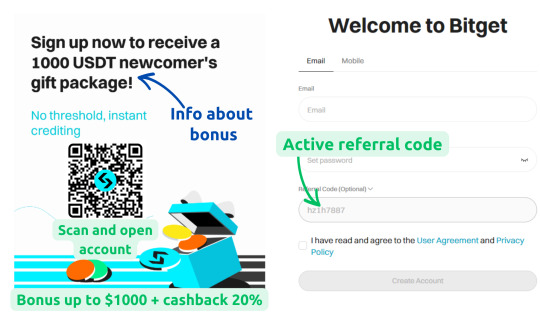
Signing up and verification on Bitget
It takes a few minutes to register on Bitget: click the link, then enter your password, phone number, email address, and referral code hz1h7887. Verify the entered information, and your cryptocurrency accounts are now active. You must upload a document and pass a face verification in order to be verified. It usually takes a few minutes as well; nothing difficult or unsettling.
Where on Bitget can I get bonuses and cashbacks?
You don’t need to do anything extra to receive cashbacks; they will be credited to your account automatically with every trade transaction (this is only applicable if you joined the exchange using the built-in cashback promo code hz1h7887).
You must finish a variety of missions and tasks from the “Rewards Center” section in order to receive incentives. We receive points for every mission finished, which can later be exchanged for USDT. So that you don’t have to spend a lot of time searching, here is a direct link to the Rewards Center.

The mobile app also features a Rewards Center, whereby there are occasionally hidden quests. This is how the exchange promotes installing the mobile software (Android | iOS).
How can I profit from Bitget in 2024?
Bitget is more than just a bitcoin buying and selling platform. Bitget can be referred to as a bitcoin goods and services supermarket. Let’s examine only the key ones.
Savings
Financial products that allow you to save cryptocurrency deposits and earn daily income in return. There are frequently campaigns wherein crypto can be “put in a box” for a month with an annualized yield of 50–100%; that is to say, you will actually receive roughly 5–10%, but just for that month! Currently, for instance, the “Savings” page appears as follows (notice that you may set USDT for 7 days at 30%, meaning that you will receive a little over 0.5% on the capital for a week — a fantastic opportunity for individuals who have studied the concept of compound interest in school):
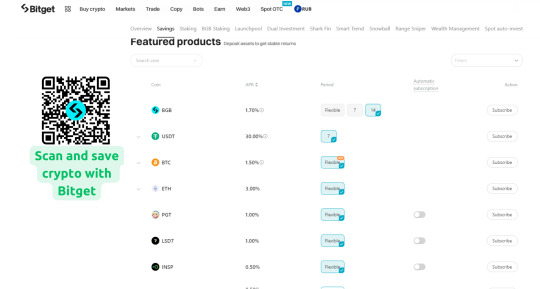
2. Staking
You can make cryptocurrency through staking in a manner analogous to a demand bank deposit. If “Savings” has an investment term, you can put cryptocurrencies in staking and take it out when the term is over if you need it or if the conditions alter for whatever reason.
3. Staking BGB
In addition to receiving an interest (2% APY), staking the project’s native token also allows you to withdraw cryptocurrency commission-free. To be able to make one free withdrawal every day, you only need to stack 2500 BGB, or roughly $1500. This is not too bad considering the hefty commissions on the network during gas wars.
4. Launchpool
In this product, we put/stake some tokens to get others. Typically, the lock happens BGB tokens, and farms tokens of new startups that are not yet traded on an exchange.
5. Copytrading
With this program we can connect to the best traders and investors and automatically repeat trades after them. You should be extremely cautious with such offers, as in fact your trades will be executed at a price slightly worse than the trader’s deal. Nevertheless, you can risk a small amount for experimentation and if the idea justifies itself, you can gradually increase the capital under the management of third parties.
We have considered only the main products of the exchange. In addition to them, the exchange has a whole list of offers: basic and advanced bots, dual investments, Shark Fin, Smart Trend, Snowball, Range Sniper, OTC-market and P2P-trading.
Bitget crypto exchange is dynamically developing and constantly pleases its customers with new financial and cryptocurrency products.
Is it possible to reduce commissions on Bitget?
In addition to the 20% cashback after joining Bitget through our link, there are 3 options to reduce fees:
Trade more intensively and move up the VIP ladder;
The higher the portfolio balance — the higher the VIP level;
The higher the BGB balance — the higher the VIP level.
Here is the table with VIP levels in 2024 (the basic level of commissions is 0.1% on spot for maker and taker, 0.02% in futures section for maker and 0.06% for taker):
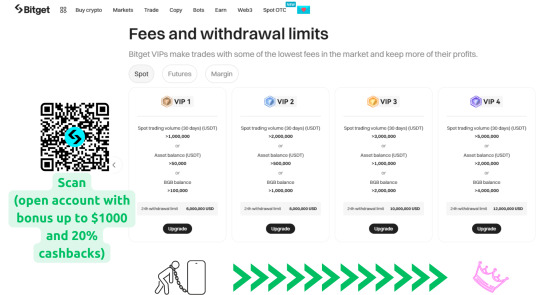
Let’s now move on to the most common questions on Bitget.
Bitget FAQ
Registration and verification on Bitget: how does it work?
The process of opening an account is done remotely: all you need to do is follow the link, click the “Register” button on the top right, enter your email/phone, password, referral code hz1h7887 and register. After that you will receive a letter to your mail or on your cell phone SMS, you need to confirm the previously entered data. Everything is ready! It remains for 5–10 minutes to pass the procedure of verification of identity (for this purpose we load a passport or driver’s license, take selfies). Let’s start trading and earning!
Why Bitget is willing to reduce commissions by 20% and still give $1000 bonuses because of your ref.code hz1h7887?
Bitget knows how to count income and expenses in their business, so they decided that the positive effect (more content from us, more users from them) would be more than a 20% reduction in their income. Everything is legal, everyone only benefits from such a scheme, so feel free to use our referral code. And bonuses are not given at all for nothing, for this you need to perform tasks that benefit not only you, but also the exchange.
What is the main feature of Bitget?
For us, the main advantage of the exchange is the availability of a large number of cryptocurrencies for staking and savings. Of course, Lionel Messi’s involvement adds a hundredfold to the exchange’s credibility.
How many coins and trading pairs are there on Bitget?
As of February 8, 2024, there are 690 coins traded on Bitget in 940 trading pairs (some coins are traded relative to multiple cryptocurrencies, such as ETH/BTC and ETH/USDT). This is one of the highest numbers in the industry, even more so with this same level of reliability.
Is Bitget a reliable crypto exchange?
We consider Bitget to be an extremely trustworthy exchange. It is consistently in the TOP-15 ratings of Coinmarketcap and Coingecko (trust index 9/10), has confirmed reserves of $1 billion and has been operating without interruptions since 2018. In practice, neither we nor any of the acquaintances in our surroundings had any problems with this exchange. We recommend it! (but the final decision is always yours). And of course, it is unlikely that the world soccer star Messi would have signed up for a scam, so the trust in the exchange is really high.
Which Bitget referral code to choose?
Of course, there are a lot of referral codes on the web, but most people just attract users to the exchange, and take the cashback and bonuses for themselves. We do things differently, we are interested in long-term cooperation on the WIN-WIN-WIN model (the exchange wins, you and us). We give all the bonuses to you, and we split cashback commissions in half. As a result, the exchange gets new users, you connect to the exchange on the best terms, and we earn our part of the commissions. Connect by promo code hz1h7887, we will support healthy market relations together with Leo Messi!
Bitget and Lionel Messi — is it true or myth?
Many people have this question: have cryptocurrencies become so popular that they are supported by world stars? Instead of a thousand words, we suggest watching this video (spoiler — yes, Leo Messi does cooperate with Bitget):
youtube
The best in the business have already realized the beauty of cryptocurrencies, join our movement and you!
Thank you for reading this article!
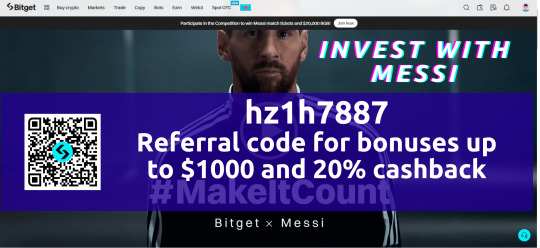
0 notes
Text
🤡 this job market is mentally exhausting and emotionally destructive 🤡
Did a phone interview and was invited for in-person interview for Thursday.
Recruiting rep did not mention the role, but I only applied for one, so I assumed it couldn't be anything else... so I go to my email to look at the original job listing.
I applied on Indeed for a Director in training role, and they replied to me to fill out an application on their website.
I do that, and it looks like a generic application, but when I searched through my job profile, I see the role is "assistant teacher," which makes $15/hour.
I call back to explain the discrepancy and to get clarification on what role I'm applying for so I can prepare accordingly.
They tell me that the role is for the assistant teacher role and that there must have been a mistake.
They encourage me to interview on Thursday anyway because they are looking to fill leadership roles.
Like I'm so in need of a job that I feel like I need to go because there are like no prospects.
but at the same time, if this is a bait and switch again, istg... I can't make a commute that is an hour and twenty minutes ONE WAY for $15/hour, and $15/hour is not enough to even pay my current bills, let alone make me financially stable enough to move or even afford to live in Chicago or Chicago suburbs.
It feels like I have to risk driving an hour twenty there and an hour twenty home just for the slim-ass possibility that I'll be interviewed for the role I applied for instead of treated like cattle that they are just mass interviewing. fmlllllllllllllllllllllllllllllll
I'm so sick of feeling so trapped. I worked so hard for so long. I am just so tired of being on bottom. I literally made more money with less responsibility when I was a high school dropout ($17/hour for healthcare data entry). Like I'm this🤏close to having a M.A. and I have been
baited and switched (signed offer $27/hour and did all onboarding stuff for them to rescind the job and offer a different one for $16/hour)
told during an interview that they feel like it would be criminal to pay me entry-level wages (because I have a degree)
told that I must sign forms saying I'm Catholic and will teach philosophy according to the school's interpretation of philosophical texts (even though none of the people who made these materials have any academic background in philosophy at all and I'm literally qualified to TEACH it and they aren't..).
ghosted after like 5-6 interviews, despite being told that they would send a rejection email if they go with another candidate
told that a role I was presently interviewing for couldn't pay more than $16/hour and only 10 hours a week, but I had to be available whenever they needed me. This was managerial work. For $16 an hour lol.
It sucks that most people I built a "network" with in undergrad either became stay at home moms, moved away, or are in fields that require teacher licensure. It feels almost impossible to get a job without knowing someone.
1 note
·
View note
Text
Getting stupidly RICH by going NUCLEAR in Cities Skylines 2!
#stupidly #RICH #NUCLEAR #Cities #Skylines
0.16 hello fellow engineers and welcome back
0.16 to my big city uh it's it's Utopia and
0.16 if you've been watching this series you
0.16 know that last time I built a load of
0.16 geothermal power plants I connected them
0.16 to a massive grid to export all that
0.16 electricity out of the map and now we
0.16 are making some stons I've…

View On WordPress
#$0 marketing#$7 affiliate marketing course#0 dollar marketing#0 investment affiliate marketing#0 investment digital marketing#0 to 1000 affiliate marketing#0 to 10000 affiliate marketing#0nline marketing#1 page marketing plan#1 page marketing plan audiobook#10 log marketing#10 minute school affiliate marketing#10 minute school digital marketing#10 minute school email marketing#12th commerce it digital marketing#12th commerce ocm chapter 8 importance of marketing#12th ocm marketing#15 psychological marketing triggers#2024 affiliate marketing#2024 digital marketing strategy#2024 digital marketing trends#2024 marketing#2024 marketing trends#2024 social media marketing#22 immutable laws of marketing#22 immutable laws of marketing audiobook#2nd puc business studies marketing chapter#2nd sem marketing management#3 cʼs of marketing#3.0 remote marketing agency
0 notes
Text
Week 2
Monday
The morning session launched the employability section of the module. It intended to plant the seed of thinking about how we will start to market ourselves once completing our degree.
We spent the rest of this day with our group attempting to come to a conclusion of where we should base our project. After contemplating for a good while, we decided to put it to a vote just so we could continue on with the project, moving on to thinking about the contents of our shop front.
The majority came to being in support of being in located in northampton as there is an old bank on the corner of the drapery, facing all saints church that sparked our interest. it has an aesthetically pleasing, original facade. The building also would have a nice view out as it is a curved corner building that can see onto one of the better looking high streets in Northampton’s town centre. To see if we could find out who owns the building without being in Northampton, I emailed the council from their website quoting the most recent authorised planning permissions so that they would know which building we were on about. I explained our situation (being students and our brief) and asked if they had any information on the building or if they had any contacts they could give to point us in the right direction. The council’s website say they should get back in contact with us within 5 working days so hopefully we have a response by the end of the week.
Tuesday
I came into the studio Tuesday evening as we were going to be in contact with Chicago via the ouija board that Sarah had made. It was really cool to see the interactions taking place and seeing their responses to our questions. I found it hard to think of questions on the spot but we did find out some interesting information about how their courses work and a bit about Chicago (having their first snow).
Wednesday
We had our scheduled feedbacks for the previous modules in the morning. I wasn’t feeling very well unfortunately so opted to receive my feedback over teams. I have been struggling mentally since being back this semester which i think stemmed from being burnt out and has spiralled. As a result of this, i will be commuting in on a Monday morning and returning back to northampton Wednesday night and remaining in Northampton until the following Monday. This will either be until i can find someone to take my tenancy at my student accommodation or until i am well enough to take care of myself. I think my grade from the local brief represents this as i feel as though i could have done a lot better if i had engaged more with the module.
We had organised as a group to take the free time in the afternoon to come in and discuss/ brainstorm ideas for the space however as I wasn’t in, I couldn’t be much help. By the sounds of it, no decisions were made as Rachel wasn’t in either so we will reconvene on Monday instead.
Thursday
Rather than attending the adobe workshop on the Thursday, i had opted to go on the school of art trip to London. We started by going to a small cafe connected to an apartment hotel that i had found online. The colour scheme and decor were really nice, choosing browns/oranges and greens. There were many plants scattered across the foyer that made the place very cosy.
We then made our way to the Victoria and Albert museum. I would’ve really liked to have seen the Chanel exhibition however it was completely sold out. Instead, we had a look around the main exhibition that they have open to the public for free. This included a range of sculptures, ironwork, garments, accessories and other objects. I had taken a range of pictures of my favourite pieces to either do some studies of when i had some free time (I would’ve liked to have sat and done some sketches but we were limited on time and chose to see as much as we could in the museum instead). The images that i had taken are now lost as i had my phone stolen 5-10 minutes before getting on the coach to leave London. While it was good to see the different exhibits, none of them spoke out to me in terms of our current project. As it was mostly traditional art there also wasn’t any creative technologies used in the free exhibits either.
Over the weekend i learnt that the gunpowder plot was conspired in Northamptonshire (Ashby house) by some wealthy men of high standing, this could be something to explore within our concept or proposal for the shopfront.
0 notes
Text
SDPL PARADISE

SDPL Paradise offers luxurious 2 BHK Flats ranging from 1175 – 1440 sq.ft. on the prominent location of Dabha, Nagpur. Experience unmatched comfort & modern living options designed specifically for individuals seeking affordable housing in our residential development, SDPL Pradise. It boasts the features that define modern day life style of urban gentry. It is a mini township spread over an area of 3 acres, first of its kind in Dabha. Elevate your lifestyle at our unique community, where every detail is crafted for your utmost satisfaction and well-being. Immerse yourself in thoughtfully designed spaces, where modern amenities seamlessly blend with tranquility.
SDPL Paradise is a mini township with vast open spaces and a community area offering amenities like Club House and Commercial Complex. It is located just 1.0 km from Vayusena Nagar and 10 minutes from Law College Square. It is close to Centre Point, Sandipani and Chanda Devi Saraf Schools. Leading banks, Market and Daily Commutation facilities are also in close proximity. The 3 wings of PARADISE with 9 floors in each wing and well-segregated commercial area will be constructed in 3 phases.
Address : 5284+6GQ, Kh.No - 53/2, 54, 58, 59/3 Behind Water Tank, Dabha, Amravati Road, Vayusena Nagar, Nagpur, Maharashtra, 440023, India
Phone : +91 976 555 0608
Business Email : [email protected]
Website : https://sandeepdwellers.com/paradise/
https://www.facebook.com/SDPL.Nagpur
https://www.instagram.com/sandeepdwellers/
https://twitter.com/SdplNagpur
https://www.linkedin.com/company/sandeep-dwellers-pvt-ltd/
https://in.pinterest.com/sandeepdweller/
https://www.youtube.com/@sdplnagpur/

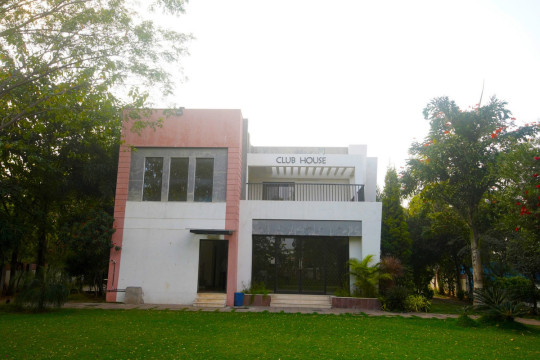




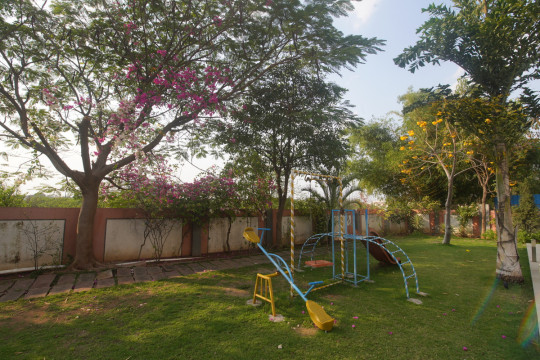

#2 BHK luxurious flats#2 BHK luxurious flats in Nagpur#2 BHK luxurious flats near me#2 BHK luxurious flats for sale#2 BHK luxurious flats for sale in Nagpur
1 note
·
View note
Text
Without Prejudice Mervelee Myers Colonisation In Reverse Challenge Sir Mark Rowley To Act About The A-Z Of Racists Police Officers He Inherited From Cresida Dick When I Am The Target Of Terrorists PC Who Continue To Breach Equality Act 2010 Protected Characteristics Interviewer 11/12/23 PC James Murphy Left Husband Hypo 2 Sent Witness Statement ASB Debbie Gilchrist PC Herman Negligence PC Edward Allen Email I Call Him BB Welfare Check 6/7/23 PC Chana Thugs Visit 26/1/23 Nigel Pearce Seb Adjei-Addoh Best Address Housing For Women Devonshires Narin Masera DJ Sterlini Hays Why Barrister A Expect Me To Be Whiter Than White For Unlawful Injunction Threats To Imprison Me For 22 Years Of Systemic Discrimination Rev Rose Hudson-Wilkin Must Mediate Diane Abbott Speak Her Truths Racism June O'Sullivan Sanctions Discrimination At BIB After I Fronted Ofsted Wrote LEYF On My Doorstep LinkedIn Oxeyes Use My Vision Website YouTube Dangle Online Community Board Then Send Email Pembroke House WLR Complaint Will Tony Cealy Border Crossings Issue Copyright For Brixton Market Someone Did For Windrush 70 ITV News Photo I Will Be Collecting My Images Google Maps Harvested 100,000+ 100,000 Views Suspend Businesses Richard Harty Will Be Charged For His Role In MIC Dag Queen Story Tellers Jumping Ship EYFS My Contributions To Early Childhood Education From Jamaica Will Be Focus Of Husband's 101 Birthday International Women's Day 2024 The Female At PPS Is Ignorant She Called 8 Minutes before Interview Her Excuses Are What Is Expected From Those I Have Dealt With Since 2017 Am Available 11/12/23
Without Prejudice Sir Mark Rowley Nigel Pearce Seb Adjei-Addoh Must Be Accountable For The Racists Terrorists Haters Target Mervelee Myers 30/10/17 11/12/23 When The Ignorant PC Conducted This Interview Online Names Of PCs Try Section Murder Kidnap Me With IOPC MOPAC Social Media Visit SPC Schools ‘Alert’ MP Diane Must Be On LEYF June O’Sullivan Liz Roberts NWM LinkedIn Stolen 3 Accounts 1st 69…

View On WordPress
#http://www.actionfraud.police.uk/#http://www.justgiving.com/Mervelee-Myers#http://www.justice.gov.uk/tribunals/employment/claims/responding#https://fght4justiceadvocacy.business.site#https://www.parkinsons.org.uk/#https://www.ryanclement.com#See https://www.facebook.com that think they can brainwash me ON THIS DAY 4 years ago Mervelee Ratty Nembhard is feeling emotional in Lond#United Kingdom. Shared with Public Thanks 1Son http://worldreferee.com/referee/valdin-legister/bio for bringing me back the Memories! Vald
0 notes
Text
The 10 Laws of Copywriting Information
This is not a course from a guru on the inspirational speaking circuit. This is not a how to guide written by a marketing intern. This content is based on real marketing experience and consistent results.
Why copywriting? What’s the big deal about it?
You could be selling your product without having to pick up the phone or getting on a Zoom call.
You could have sent that uncomfortable email to your kid’s teacher in two minutes -- instead of sweating over it for two days.
I’m serious. This isn’t clickbait. Those are both possible (and actually become easy) if you can get good at copywriting.
Copywriting isn’t like the regular writing they wanted to teach you in school (I think I got a D in high school english btw…)
Copywriting is headlines, hooks, and stories.
It’s short, choppy copy crafted to get your attention and KEEP IT.
It’s a way of writing that will:
Reach through the screen of your customer’s iPhone and hold their hand all the way through checkout.
Get complete strangers to instantly know, like, and trust your brand (and then tell all of their friends about you too).
Improve your communication and leadership skills -- whether you need to send that clear and persuasive company email as a manager, or that uncomfortable email to your landlord or your kid’s teacher.
Actually get people to respond to your emails (imagine that).
Copywriting is the single most important skill to master in business, and for the first time I’m going to share my 10 laws of copywriting with you:
Law #1: You must learn how people make decisions.
Law #2: You must uncover the selfish benefit.
Law #3: You must learn how to tell a great story.
Law #4: You must write like you talk.
Law #5: You must use your customer's words, not yours.
Law #6: You must write short, choppy copy.
Law #7: You must be specific.
Law #8: You must nail the headline.
Law #9: You must back everything up with social proof.
Law #10: You must address objections upfront.
About Author
One of the top marketing minds in the country, Dave Gerhardt helps businesses with brand building and marketing strategy. He’s the founder of Exit Five, a media company focused on B2B marketing, and former Chief Brand Officer at Drift and Chief Marketing Officer at Privy. A guest lecturer at Harvard Business School, Dave has traveled the world speaking and coaching marketing teams and startup founders. He lives with his family in Burlington, Vermont. Learn more about working with Dave at davegerhardt.com
More courses from the same author: Dave Gerhardt
0 notes